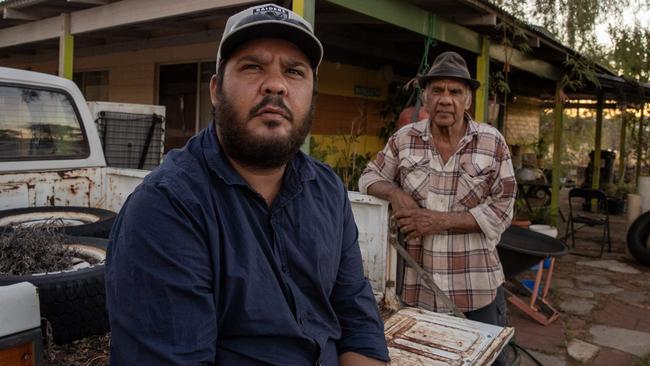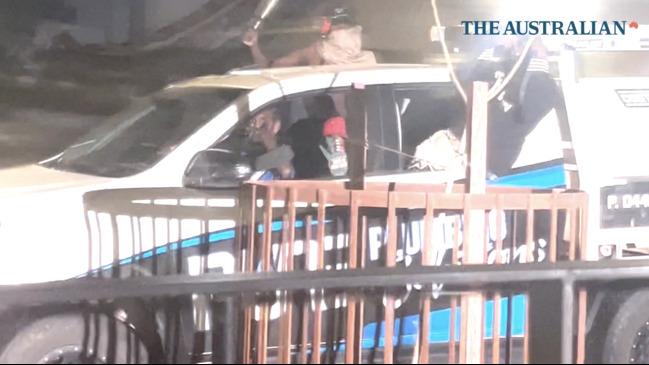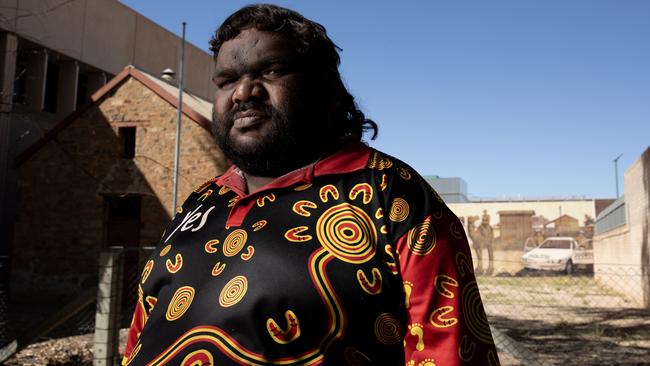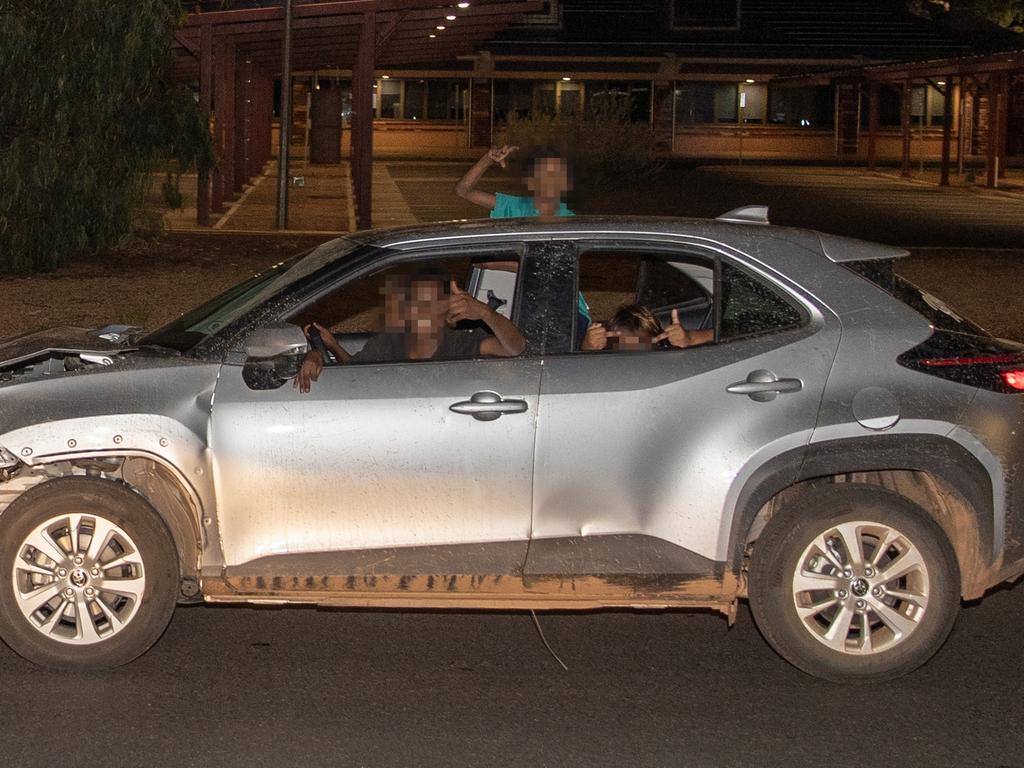‘This situation is a travesty’: justice not served in this territory
Aboriginal people accused of crimes in Alice Springs are increasingly forced to represent themselves after a staff exodus from the country’s largest Indigenous legal service.

Last month, 79-year-old Mick Liddle drove to the Alice Springs courthouse every day for almost two weeks in the hope his grandson, Anthony Kenny, would be able to face a judge for a bail application on a drink-driving charge.
Liddle would arrive by 9am and sit in the waiting area wearing his fedora and collared shirt, his walking stick by his side, for the whole day.
Every night when he got home, Liddle would study the Northern Territory bail legislation, writing meticulous notes by hand, in case he was required to stand up before the judge and speak on behalf of his grandson.
In almost any other jurisdiction, Kenny would have been granted bail within a day or two. But it took 11 days for the 32-year-old, a full-time employee of Territory Housing, to have his bail application heard in the NT’s overwhelmed and under-resourced justice system. That meant 11 days locked in a packed cell in the Alice Springs watch-house, with no fresh air, faulty air conditioners and the lights permanently on.
When Kenny was finally brought up from the cells, his grandfather let out a sigh of relief. Kenny looked up and let out a small smile when he saw his father and grandfather sitting at the back of the courtroom.
“I could see on his face he was very happy to see us,” Liddle said.
Liddle clutched his notes tightly; at one point it appeared he might have to rise to his feet to make his submissions to the judge.

Aboriginal people accused of crimes in Alice Springs have increasingly been forced to represent themselves in court following a mass exodus of staff from the country’s largest Indigenous legal service, the North Australian Aboriginal Justice Agency. The departures have sparked renewed calls for more transparency around federal government funding for the embattled organisation.
But on Kenny’s 11th day in custody, a lawyer from NAAJA was able to represent him. “It was unbelievable, I couldn’t understand why it was all done,” Liddle told The Australian. “I doubt it very much this would happen to a whitefella – the Aboriginal people don’t really have a chance to say anything, because nobody really listens. They’ve got no opportunity to complain about it because they don’t have the necessary education to complain, but someone like myself can complain or say something.
Liddle said: “I felt relieved but I couldn’t understand why it took 11 days for him to be released from custody.”
The exasperated judge who finally heard Kenny’s bail application – and approved it – agreed. “The situation is a travesty and a human rights issue of significant proportion,” judge Carly Ingles said. “At the moment, ours is not a criminal justice system you want to be getting yourself involved in, the situation is dire.”
Kenny’s long wait for bail provides a glimpse of the shocking state of the court system in the Territory, and especially Alice Springs. The Australian spent three weeks observing various courtrooms in the town.

The Alice Springs local court is like no other. Despite being at the heart of the nation, many defendants cannot speak English, let alone follow the legal intricacies of their cases. Translators can speak most of the different dialects but many of the concepts are foreign.
Judges do their best to explain criminal jargon to defendants by using language that is commonplace to them, such as substituting “charges” for “trouble”.
Children run around the noisy courthouse. Adults yell out. Many defendants are barefoot or simply wear socks. Dozens of people flow in and out every day; overworked lawyers frantically rush from courtroom to courtroom, and to and from the cells.
One Alice Springs lawyer recalled a day at the end of last year when the cells beneath the court were “like Mississippi in the 70s”.
“They were all screaming ‘lawyer, lawyer, lawyer’,” said the lawyer, who confessed to having broken down and cried.
Another lawyer described the cells as a “sea of black”.
“You go to a NSW prison, there’s a pretty big Aboriginal population, it’s very mixed. In the Territory, a non-Indigenous person is a minority, it’s rare,” the lawyer said.
A sign at the registry, which is almost always on display, reads: “Front counter closed today due to staff shortage.”
Those on the ground fear the system is on the brink of collapse, not just because of a severe shortage of permanent staff, but because the Territory’s crime crisis is pushing so many people into the justice system.

One fly-in lawyer from the east coast asked The Australian: “Why would anyone want to live here?”
There’s also a shortage of judges, adding to the pressure on the court system, with some having to be flown in from Darwin.
One unrepresented man, Leelin Anzac, had been summonsed to court because he had allegedly not paid his restitution for previous offending. Darwin judge John Neill ordered that a police officer enter the court and lead him to the cells.
“I put him in the cells today, it was the only way I could think of to get him some legal advice,” Judge Neill said.
On another day, the court could not make the time to hear a bail application of a woman who was more than 20 weeks pregnant. Despite her NAAJA lawyer telling the court she was allegedly the victim of domestic violence twice over the weekend – and had to be hospitalised – she was told her application could not be heard until the following week.
The lawyer was told to take it to the Supreme Court – but there was no availability for days, despite the woman having an antenatal appointment.

In the end, a judge heard her bail application and she was released after three days in custody.
Paul Pumpjack was arrested in front of his four-year-old son while making pancakes, placed in handcuffs and thrown into a divvy truck. He spent the next two days behind bars in the remote community of Papunya, unable to get before a magistrate or judge before it was discovered the arrest warrant had been falsely issued. There wasn’t even paperwork to say why he’d been arrested.
Pumpjack was released at the end of a court day after a NAAJA lawyer realised he was being held without charge and intervened.
On some occasions, NAAJA was representing 90 per cent of the daily court list with just three lawyers. They readily concede they can’t give defendants the representation they deserve. Despite being banned from taking new files, the NAAJA lawyers were, in extreme cases, doing just that.
One Indigenous woman, Joanne Bloomfield, pleaded guilty because she couldn’t get a lawyer after being charged with driving while unlicensed. The single mother of two was driving to Coles to get food when she was pulled over by police. She is on Centrelink and has $20,115 in unpaid fines, but has never held down a job.
This time around, she was given a fine of about $2000. She knows she can never pay it off. Everyone in the court knows she can never pay it off.







